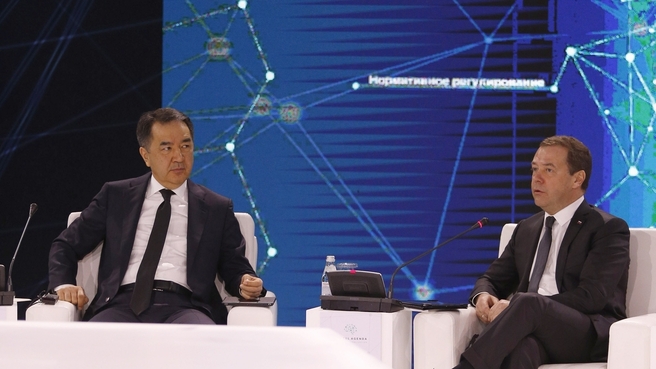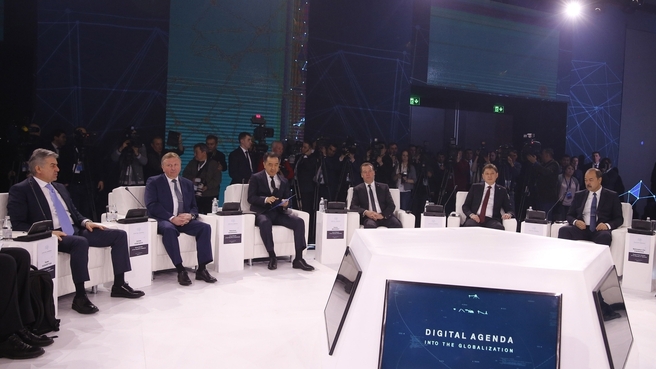The forum is designed to promote the EAEU’s role in global digitalisation and enhance partnerships in this area among member countries. The forum’s main topic is integration of IT systems within the Eurasian Economic Union.
Excerpts from Dmitry Medvedev’s remarks at the forum’s plenary session:
We should not think that all of us, even the most developed countries, will be able to push forward the digital agenda within a limited timeframe. In fact, the digital divide is too large.
All our countries are implementing programmes to bridge this gap, but the digital divide is still there. This is a key matter of concern. As long at the digital divide remains in place among the five EAEU member countries, as well as within the CIS, Europe and Asia, and across the planet in general, the digital agenda will not become universal.
The digital agenda transcends the boundaries we are used to, creating a common digital space. The question is how fast it will advance, and to what extent we will be willing to cooperate with each other? Will we be able to adapt to the trends that are gaining momentum across the world?
Today, the five EAEU countries will have a detailed discussion on ways to coordinate our efforts in this area. It is obvious that we will not be able to do anything acting separately. We need to unify our markets for goods, human resources, logistics and technology and develop our own infrastructure.
Russia assumes the rotating presidency of the EAEU bodies in 2018. The digital agenda will be an integral part and a cross-cutting issue in our relations. We will work on it in all possible areas. The party that will come up with a reliable, resource-light and transparent regulatory framework will be the one who wins this race. It is true that the processes unfolding in the digital world call for trans-border regulations and require a softer, rather than the traditional, approach. Excessive conservative regulation may undermine our competitiveness. We need legal mechanisms for processing, analysing anonymous big data coming from all of our five countries.
IT security and the safety of personal, corporate and government data are also high on the agenda. As digital services develop, we need to find ways to counter hacking attacks, not to mention cyber fraud or terrorism. These are essential goals.
There is a programme in Russia, The Digital Economy, implemented along the five main axes: regulation, infrastructure, technological advances, security, human resources and education. Action plans have already been approved for four of these five areas. This programme is like a living organism in that it is poised to evolve moving forward.
Digital assets, or crypto assets, have become an intensely debated issue. I have to say that I am rather pessimistic when it comes to this phenomenon. No one knows whether these virtual currencies are here to stay. We do not know whether they are a universal payment instrument that can compete against conventional currencies. Maybe it is just a bubble that will burst at a certain moment, leaving a void behind it? What I can say for sure is that the blockchain technology is a fundamental breakthrough in terms of the principles behind it.
In any case, we must not isolate ourselves within our national models. These principles cannot be implemented within a single country. We need to align our approaches within the union. Ideally, crypto assets should be regulated by international conventions. Otherwise, the whole process could head in a different direction, becoming unintelligible, if not illegal.
Participants in the Supreme Eurasian Economic Council meeting in Sochi on 11 October 2017 approved a concept of the digital agenda and outlined its priorities. Today, we will sign an agreement on the identification labelling of goods. All these steps are headed in the direction we are talking about.
It is essential that we agree on the terms and start working on supra-national infrastructure solutions and supra-national digital technology right away. There could be three elements in this integration effort.
We could refer to the first element as EurAsEC Data X, a single sub-system for transferring and exchanging machine-readable data. This platform would feature regulatory databases and could be used for exchanging information, enabling private companies to exchange binding protocols.
I would call the second element EurAsEC ID as an integrated space of mutual trust. It would include identification, authentication, authorisation services and a digital archive. At the end of the day, this would enable our countries to deliver digital certificates to nationals from other countries. Blockchain technology could also be used to this effect, since it is all about mutual trust.
The third element could be called EurAsEC Geo, representing a geo-information system and mapping services for streamlining controls over the transportation and traceability of goods. While this is a purely economic task, it is nevertheless extremely important.
We will also have to agree on common standards, and on coordinating the decisions we take within our countries. We are ready to share our practical experience with our friends and partners for free. The single platform architecture should be open for EAEU countries, as well as for our partners with whom we are holding talks. The Eurasian Economic Commission has a key role to play in these efforts.














